| dc.contributor.author | Yıldız, Mustafa | |
| dc.contributor.author | Terzi, Hakan | |
| dc.contributor.author | Yıldız, Saliha Handan | |
| dc.contributor.author | Varol, Nuray | |
| dc.contributor.author | Özdemir Erdoğan, Müjgan | |
| dc.contributor.author | Kasap, Murat | |
| dc.contributor.author | Akçalı, Nermin | |
| dc.contributor.author | Solak, Mustafa | |
| dc.date.accessioned | 2021-05-05T22:11:52Z | |
| dc.date.available | 2021-05-05T22:11:52Z | |
| dc.date.issued | 2020 | |
| dc.identifier.issn | 1300-0144 | |
| dc.identifier.uri | https://doi.org/10.3906/sag-2005-321 | |
| dc.identifier.uri | https://hdl.handle.net/20.500.12933/196 | |
| dc.description | PubMed: 32682359 | en_US |
| dc.description | 2-s2.0-85098783154 | en_US |
| dc.description.abstract | Background/aim: Thermopsis turcica is a perennial species endemic to Turkey and different extracts of T. turcica have an antiproliferative effect on cancer cells, but there has not been any report on HeLa (human cervical cancer) cells. Materials and methods: To get a better understanding of the molecular mechanism of anticancer activity of methanolic extracts of leaves (LE) and flowers (FE) of T. turcica, we employed 2-DE-based proteomics to explore the proteins involved in anticancer activity in HeLa cells. Results: T. turcica extracts showed a potent cytotoxic effect on HeLa cells with the IC50 values of 1.75 mg/mL for LE and 3.25 mg/mL for FE. The induction of apoptosis by LE and FE was also consistent with increased expression of caspase mRNAs and DNA fragmentation. In terms of the proteomic approach, 27 differentially expressed proteins were detected and identified through MALDI-TOF/TOF mass spectrometry. These altered proteins were involved in cytoskeleton organization and movement, protein folding, proteolysis and translation, cell cycle and proliferation, signal transduction, cell redox homeostasis, and metabolism. Conclusion: Up-regulation of protein disulfide isomerases and down-regulation of Rho GDP-dissociation inhibitor, heterogeneous nuclear ribonucleoproteins, and heat shock proteins may contribute to the induction of apoptosis and arresting of the cell cycle in HeLa cells. © TÜBİTAK. | en_US |
| dc.description.sponsorship | Afyon Kocatepe Üniversitesi: TEMAT?K.01 | en_US |
| dc.description.sponsorship | This work was supported by Afyon Kocatepe University Scientific Research Projects Coordination Unit (project number: 15.TEMATİK.01). The authors also wish to thank Afyon Kocatepe University’s Foreign Language Support Unit for language editing. | en_US |
| dc.description.sponsorship | This work was supported by Afyon Kocatepe University Scientific Research Projects Coordination Unit (project number: 15.TEMAT?K.01). The authors also wish to thank Afyon Kocatepe University?s Foreign Language Support Unit for language editing. | en_US |
| dc.language.iso | eng | en_US |
| dc.publisher | Turkiye Klinikleri | en_US |
| dc.rights | info:eu-repo/semantics/openAccess | en_US |
| dc.subject | Anticancer activity | en_US |
| dc.subject | Apoptosis | en_US |
| dc.subject | Human cervical cancer | en_US |
| dc.subject | Proteomics | en_US |
| dc.subject | Thermopsis turcica | en_US |
| dc.title | Proteomic analysis of the anticancer effect of various extracts of endemicThermopsis turcica in human cervical cancer cells | en_US |
| dc.type | article | en_US |
| dc.department | AFSÜ, Tıp Fakültesi, Dahili Tıp Bilimleri Bölümü, Tıbbi Genetik Ana Bilim Dalı | |
| dc.contributor.institutionauthor | Yıldız, Saliha Handan | |
| dc.contributor.institutionauthor | Varol, Nuray | |
| dc.contributor.institutionauthor | Özdemir Erdoğan, Müjgan | |
| dc.contributor.institutionauthor | Akçalı, Nermin | |
| dc.contributor.institutionauthor | Solak, Mustafa | |
| dc.identifier.doi | 10.3906/sag-2005-321 | |
| dc.identifier.volume | 50 | en_US |
| dc.identifier.issue | 8 | en_US |
| dc.identifier.startpage | 1993 | en_US |
| dc.identifier.endpage | 2004 | en_US |
| dc.relation.journal | Turkish Journal of Medical Sciences | en_US |
| dc.relation.publicationcategory | Makale - Uluslararası Hakemli Dergi - Kurum Öğretim Elemanı | en_US |
















